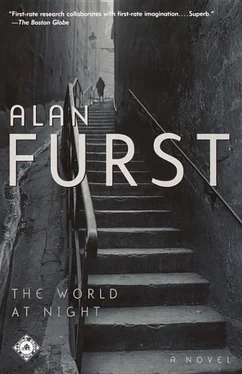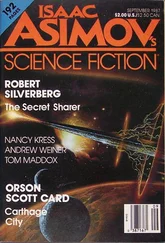Alan Furst - The World at Night
Здесь есть возможность читать онлайн «Alan Furst - The World at Night» весь текст электронной книги совершенно бесплатно (целиком полную версию без сокращений). В некоторых случаях можно слушать аудио, скачать через торрент в формате fb2 и присутствует краткое содержание. Жанр: Шпионский детектив, на английском языке. Описание произведения, (предисловие) а так же отзывы посетителей доступны на портале библиотеки ЛибКат.
- Название:The World at Night
- Автор:
- Жанр:
- Год:неизвестен
- ISBN:нет данных
- Рейтинг книги:5 / 5. Голосов: 1
-
Избранное:Добавить в избранное
- Отзывы:
-
Ваша оценка:
- 100
- 1
- 2
- 3
- 4
- 5
The World at Night: краткое содержание, описание и аннотация
Предлагаем к чтению аннотацию, описание, краткое содержание или предисловие (зависит от того, что написал сам автор книги «The World at Night»). Если вы не нашли необходимую информацию о книге — напишите в комментариях, мы постараемся отыскать её.
The World at Night — читать онлайн бесплатно полную книгу (весь текст) целиком
Ниже представлен текст книги, разбитый по страницам. Система сохранения места последней прочитанной страницы, позволяет с удобством читать онлайн бесплатно книгу «The World at Night», без необходимости каждый раз заново искать на чём Вы остановились. Поставьте закладку, и сможете в любой момент перейти на страницу, на которой закончили чтение.
Интервал:
Закладка:
“Suzy Balcon, Jean-Claude. Remember where you heard that.”
“Oh?”
“I’ll send a photo over. She’s tall and sophisticated-but she puts your mind in the gutter. Mm. Never mind Citrine.”
Two businessmen maneuvered down the packed aisle and managed to squeeze themselves around the tiny table next to Casson. “Two hundred German tanks on fire,” one of them said. “Just imagine that.”
Back at the office, Gabriella: “Your wife called, Monsieur Casson. She said to tell you that the dinner has been canceled, and would you please telephone her when you have a moment. She’s at the beauty parlor until three-thirty, home any time after that.”
“Gabriella, do you think you could find me Le Temps ?” For Casson, a day without a newspaper was agony.
“I can go to the tabac.”
“I would really appreciate it.”
“I’ll go, then. Oh, Maitre Versol asks that you call him.”
“No.”
“Yes, monsieur. I am afraid so.”
Back in his office, Casson retrieved the swollen dossier from the bottom drawer where he’d hidden it from himself. In 1938, someone at Pathe had woken up one morning with a vision: the world could simply not go on without another remake of Samson and Delilah. And Jean Casson had to produce. Costume epics were not at all his specialty, but Pathe was huge and powerful and deaf-the only word they could hear was yes.
He got a script. Something close to it, anyhow. Signed a Samson who, from medium range in twilight, looked strong, and a reasonable Delilah-overpriced but adequately sultry. Pathe then canceled the project, paid him based on the escape clauses, and went on to new visions. Casson tied up the project, or thought he did.
One small problem: his production manager had ordered four hundred beards. These were for the extras, and were composed of human hair, prepared by the estimable theatrical makeup house LeBeau et cie. Cost: 5,000 francs. Somewhere just about here the problems began. The beards were, or were not, delivered to a warehouse Productions Casson rented in Levallois. Subsequently, they were returned to LeBeau. Or perhaps they weren’t. LeBeau certainly didn’t have the beards-or thought he didn’t. Casson didn’t have them either-as far as he knew. It was all tres difficile.
Casson made the telephone call, writhing in silent discomfort. LeBeau couldn’t actually sue him-the money was too little, the loss of business too great. And Casson couldn’t tell LeBeau to take his beards and the rest of it-films could not be made without a theatrical makeup supplier. Still, this was an affair of honor, so Casson had to endure Maitre Versol’s endless drivel as a weekly punishment. The lawyer didn’t attack or threaten him; the world-a murky, obscure entity-was the villain here, see how it took men of exquisite integrity and set them wandering in a forest of lost beards. Where were they? Who had them? What was to be done? Tres difficile.
When he got off the phone, Gabriella came in with a copy of Le Temps. It had a certain puffy quality to it-obviously it had been read, and more than once-but a look in Gabriella’s eye told him to be thankful he had a newspaper and not to raise questions about its history.
There wasn’t all that much to read: Germany had attacked Belgium and the Netherlands and Luxembourg, the French army had advanced to engage the Wehrmacht on Belgian territory, a stunning assortment of world leaders were infuriated, and:
The characteristics of the French soldier are well-known, and he can be followed across the ages, from the heroic fighters of the feudal armies to the companies of the Ancien Regime, and on to the contemporary era. Are they not the characteristics of the French people? Love of glory, bravery, vivacity?
5:20 P.M.
Headed for the one appointment he’d looked forward to all afternoon-drinks at a sidewalk table at Fouquet-Casson left the office ten minutes before he really had to, and told Gabriella he wouldn’t be back.
Marie-Claire had called at four; the dinner was now definitely on for tonight. They had, in a series of telephone calls, talked it out- Yvette Langlade, Francoise, Bruno, and the others-and reached agreement: in her hour of crisis, France must remain France. Here Marie-Claire echoed that season’s popular song, Chevalier’s “Paris Reste Paris.” It was, Casson suspected, the best you could do with a day when your country went to war. Children would be born, bakers would bake bread, lovers would make love, dinner parties would be given, and, in that way, France would go on being France.
And would he, she would be so grateful, stop at Cremerie Boursault on the way home from the office and buy the cheese? “A good vacherin, Jean-Claude. Take a moment to choose-ripe, runny in the middle, French not Swiss. Please don’t let her sell you one that isn’t perfect.”
“And we’re how many?”
“Ten, as planned. Of course Francoise and Philippe will not be there, but she telephoned, very firm and composed, and said it was imperative we go ahead. We must. So I called Bibi Lachette and explained and she agreed to come.”
“All right, then, I’ll see you at eight-thirty.”
For the best, he thought. He walked down Marbeuf and turned onto the Champs-Elysees. At twilight the city throbbed with life, crowds moving along the avenue, the smells of garlic and frying oil and cologne and Gauloises and the chestnut blossom on the spring breeze all blended together. The cafes glowed with golden light, people at the outdoor tables gazing hypnotized at the passing parade. To Casson, every face-beautiful, ruined, venal, innocent-had to be watched until it disappeared from sight. It was his life, the best part of his life; the night, the street, the crowd. There would always be wars, but the people around him had a strength, an indomitable spirit. They cannot be conquered, he thought. His heart swelled. He’d made love all his life-his father had taken him to a brothel at the age of twelve-but this, a Paris evening, the fading light, was his love affair with the world.
He reached in his pocket, made sure he had money. Fouquet wasn’t cheap-but, an aperitif or two, not so bad. Then the vacherin, but that was all. Marie-Claire’s apartment was a ten-minute walk from the rue Chardin, he wouldn’t need a taxi.
Money was always the issue. His little house in Deauville was rented. Not that he told the world that, but it was. He did fairly well with his gangsters and doomed lovers-they paid his bills-but never very well. That was, he told himself, just up ahead, around the next bend in life. For the moment, it was enough to pay the bills. Almost all of them, anyhow, and only a month or two after they were due.
But in Paris that was typical, life had to be lived at a certain pitch. His father used to say, “The real artists in Paris are the spenders of money.” He’d laugh and go on, “And their palette is-the shops!” Here he would pause and nod his head wisely, in tune with the philosopher-knave side of his nature. But then, suddenly, the real ending: “And their canvas is life!”
Casson could see the performance in detail-it had been staged often enough-and smiled to himself as he walked down the crowded avenue. Casson wondered why, on the night his country went to war, he was thinking about his father. The father he remembered was old and corrupt, a rogue and a liar, but he’d loved him anyhow.
Casson needed only a moment to search the crowded tables-what he was looking for was easy to find. Amid the elegant patrons of Fouquet, the women with every inch of fabric resting exactly where they wished, the men with each hair exactly where they’d put it that morning, sat a ferocious, Bolshevik spider. Skinny, glaring, with unruly black hair and beard, a worker’s blue suit, an open-collar shirt, and bent wire-frame Trotsky eyeglasses. But this one was no artsy intellectual Trotskyite- you could see that. This one was a Stalinist to his bloody toenails and, momentarily, would produce a sharpened scythe and proceed to dismember half the patronage of Fouquet’s, while the waiters ran about hysterically, trying to present their bills to a dying clientele.
Читать дальшеИнтервал:
Закладка:
Похожие книги на «The World at Night»
Представляем Вашему вниманию похожие книги на «The World at Night» списком для выбора. Мы отобрали схожую по названию и смыслу литературу в надежде предоставить читателям больше вариантов отыскать новые, интересные, ещё непрочитанные произведения.
Обсуждение, отзывы о книге «The World at Night» и просто собственные мнения читателей. Оставьте ваши комментарии, напишите, что Вы думаете о произведении, его смысле или главных героях. Укажите что конкретно понравилось, а что нет, и почему Вы так считаете.












